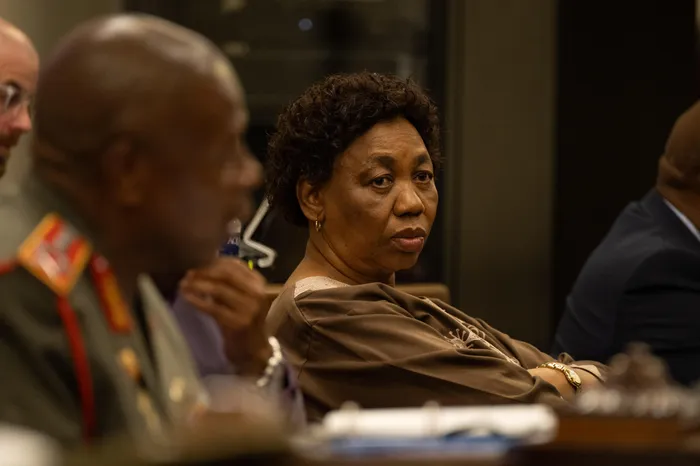Minister Angie Motshekga outlines the SANDF troop withdrawal from the DRC for regional stability

South Africa's Defence Minister Angie Motshekga announces phased withdrawal of troops from DRC amid peace efforts
Image: Henk Kruger / Independent Media
DEFENCE and Military Veterans Minister, Angie Motshekga, announced yesterday the phased withdrawal of South African National Defence Force (SANDF) troops from the Democratic Republic of Congo (DRC).
This signals a new chapter in regional peacekeeping efforts under the Southern African Development Community (SADC) mandate.
During a media briefing held at the Government Communications Information Service (GCIS), Motshekga said the decision followed extensive diplomatic engagements and notable progress in stabilising the eastern DRC, particularly around Goma and the surrounding territories of Sake.
A Region on the Path to Peace
“For the past four months, the region has witnessed a renewed momentum towards peace and stability in the eastern provinces of the DRC,” the Minister said.
“This progress is a testament to the dedicated efforts of regional leaders, diplomatic engagements, and the commitment of all stakeholders involved.”
The announcement comes after the recent SAMIDRC Summit of Heads of State and Government in Harare on March 13, concluding with a consensus to gradually withdraw peacekeeping forces to allow political and diplomatic processes to take root and resolve ongoing security challenges.
Background: Tensions in Eastern DRC and the Role of M23
The eastern DRC has long been a volatile region, plagued by clashes between government forces and various rebel groups, most notably the M23 movement.
Backed by neighbouring Rwanda and with alleged support from other regional actors, M23 has been accused of destabilising the region through armed conflict, including alleged attacks on civilian populations and military installations.
In recent years, the conflict escalated, leading to significant humanitarian crises and regional insecurity.
The SANDF and troops from Tanzania and Malawi were deployed as part of the SADC-led peacekeeping mission to support the DRC government in stabilising the eastern provinces, particularly around Goma. This city has often been at the frontline of clashes.
Progress Toward Peace and the Role of Diplomacy
The recent peace efforts culminated in a landmark agreement brokered with the support of the African Union, SADC, and the East African Community.
The DRC government and M23 representatives signed a comprehensive peace deal, committing to cease hostilities, disarmament, reintegration of combatants, and civilian protection.
Regional leaders, including South Africa, have actively supported these diplomatic processes.
“The peace agreement is a crucial step forward,” said Motshekga.
“It demonstrates the collective will of regional stakeholders to pursue a peaceful resolution rather than prolonged military engagement.”
A Phased and Respectful Withdrawal
She stated that the decision to withdraw SANDF troops is based on a careful assessment that the region’s security environment has improved sufficiently to allow for a transition.
She said the phased withdrawal will ensure that logistical support continues and personnel and equipment safety are maintained throughout the process.
“Our troops have served with distinction and professionalism,” Motshekga said.
“We are grateful for their sacrifice and dedication, which have been instrumental in creating the conditions for peace.”
Acknowledging Sacrifice and Looking Ahead
The Minister paid tribute to the soldiers who lost their lives during the mission and expressed heartfelt gratitude on behalf of the nation.
“To the families of those who made the ultimate sacrifice, we share your grief and honour their memory. Their courage has helped pave the way for peace in the region.”
She also reassured that South Africa remains committed to supporting the DRC’s sovereignty and stability through diplomatic, developmental, and humanitarian efforts.
“Our engagement does not end here. We will continue to work with regional partners to foster a peaceful, prosperous, and stable DRC, aligned with the African Union’s Agenda 2063.”
Motshekga extended her gratitude to the troop-contributing countries, especially Tanzania and Malawi, and regional bodies such as SADC and EAC for their collective commitment to peace.
She said that the Chief of the South African National Defence Force, General Rudzani Maphwanya, will provide operational details regarding the withdrawal, emphasising the sensitive nature of the process involving multiple nations and regional institutions.
The eastern DRC, particularly around Goma — an economic hub near Rwanda — has been a hotspot of conflict involving rebel groups like M23.
The group’s resurgence, allegedly backed by Rwanda, has led to regional instability, with clashes involving the DRC military and regional peacekeepers.
The recent peace agreement and ongoing diplomatic efforts aim to address these complex security challenges, paving the way for a peace process.